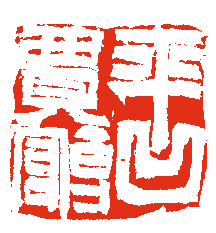Q: What the heck is this?
A: Ugly Stone (aka the Jia Pingwa Project) grew out of the research conference “Bringing Chinese Literature to World,” held March 17-20, 2016, at the Jia Pingwa Institute in Xi’an. In a series of round tables and presentations hosted by Professor Ji Jin of Soochow University, participants discussed the challenges and opportunities facing Chinese authors in translation. Although Jia, along with peers such as Wang Anyi, Han Shaogang, Ning Ken, Feng Jicai, Ye Zhaoren, Tie Ning (among many others) continue to publish challenging and important works of literature to widespread acclaim in China, outside of Chinese-speaking academics, these contemporary Chinese authors remain largely unknown in English. The goal of this website is not only to share the works of Jia Pingwa with the English-speaking world, but also to provide a resource for publishers who would like to make more of Jia’s work available in translation.
Q: Why ‘Ugly Stone’?
A: “Ugly Stone” is the title of a famous short story by Jia Pingwa about a seemingly worthless rock. The ‘ugly stone’ is both a reference to Cao Xueqin’s masterpiece, Story of the Stone (aka Dream of the Red Chamber), and also a metaphor for Jia and his work. Likewise, it seemed to be a fitting comment on the status of not only Jia’s work in translation, but the more general lack of interest in Chinese literature in English translation (Mo Yan’s Nobel win notwithstanding).
Q: So Jia’s really famous in China, right? What makes you guys think he’s going to be famous in English, too?
A: While success in one language is no guarantee of success in another, the best known Chinese authors in English (for example, Yu Hua, Yan Lianke, Su Tong, and Mo Yan) are also widely available in English translation. Jia’s work is very dark, not only thematically, but also in the sense that the message he is trying to convey is often opaque. If you like authors like Hubert Selby Jr., Cormac McCarthy, Bret Easton Ellis, Chuck Palahniuk, and James Ellroy, you’ll probably like Jia Pingwa, too.
Q: So if he’s so great why have only two of his books been translated into English? Mo Yan won the Nobel in 2012, so doesn’t that mean the best Chinese author has already been translated?
A: Chinese novelists like Mo Yan who have had the good fortune to attract the attention of skilled translators such as Alan Barr, Micheal Berry, Howard Goldblatt, Canaan Morse, Carlos Rojas, Darryl Sterk, and Josh Stenberg represent a very small slice of Chinese literature. Mo Yan is great, but Jia Pingwa represents a very different tradition in Chinese literature. They both write about the countryside, but while Mo Yan builds a symphony of “daft hillarity,” Jia Pingwa is “quietly devastating.” (For a more in-depth analysis of Jia’s writing style, see this short essay.)
Q: But literature is like a free market right? The best stuff gets translated and then people buy more of it and more of the good stuff gets translated. Why go to all this trouble if his work can sell itself?
A: Like any market, what gets translated is decided by not only by demand, but also by supply. The difficulty of learning Chinese means English speakers who achieve a high enough level of fluency in Chinese to become literary translators do so over many years of academic study. This predisposes them to become professors or professionals in other fields – especially given the difficulty of making a living from literary translation alone, and the limited opportunities in the publishing industry for translated fiction. As professors, meanwhile, they are expected to devote the lion’s share of their time to pursuits which will raise the profile of their university: publishing original research, teaching undergraduate courses, and mentoring graduate students.
Almost all currently active Chinese-English literary translators working outside of universities, meanwhile, depend on day jobs and grants to finance low-paying literary translation work, while others are themselves established authors who take time away from their own work to translate as a favor to friends and authors they admire.
Suffice it to say, if someone has gone to the trouble of translating a Chinese author into English, it usually means they really like his work. As fans of Jia Pingwa, we hope that you will give him a shot.
Q: Okay, you’ve sold me on trying out this Jia Pingwa guy. Where should I start?
If you want to read his most famous novel, Ruined City, Howard Goldblatt has already translated the whole thing, just out this year, plus Turbulence, from the early-nineties.
If you want to get a taste of Jia’s more recent work, take a look at The Poleflower, published to some controversy earlier this year. The first three chapters have been translated by Nick Stember. Nick has also translated the first chapter of Master of Songs, another more recent novel by Jia that mixes modernist narrative with traditional storytelling.
Shaanxi Opera is Jia’s magnum opus, and the first six chapters of are available here, translated by the sardonic sage Dylan Levi King.
Finally, three chapters of Old Kiln Village, Jia’s treatment of the Cultural Revolution, have been lovingly rendered in English by Nicky Harman, and can be read here.
– Nick Stember, December 2016
